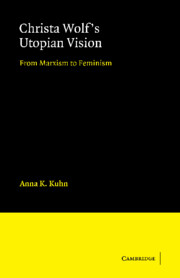Book contents
- Frontmatter
- Contents
- Acknowledgments
- List of abbreviations
- 1 Introduction: setting the context
- 2 Beginnings: experimentation with Socialist Realist paradigms
- 3 Christa T.: the quest for self-actualization
- 4 Patterns of Childhood: the confrontation with the self
- 5 No Place on Earth: revision of the Romantic heritage
- 6 Cassandra: myth, matriarchy, and the canon
- 7 In lieu of a conclusion. Störfall: the destruction of utopia?
- Notes
- Bibliography
- Index
7 - In lieu of a conclusion. Störfall: the destruction of utopia?
Published online by Cambridge University Press: 18 September 2009
- Frontmatter
- Contents
- Acknowledgments
- List of abbreviations
- 1 Introduction: setting the context
- 2 Beginnings: experimentation with Socialist Realist paradigms
- 3 Christa T.: the quest for self-actualization
- 4 Patterns of Childhood: the confrontation with the self
- 5 No Place on Earth: revision of the Romantic heritage
- 6 Cassandra: myth, matriarchy, and the canon
- 7 In lieu of a conclusion. Störfall: the destruction of utopia?
- Notes
- Bibliography
- Index
Summary
The events of 26 April 1986 have left an indelible impression on all of us old enough to understand their import. At 1.25 a.m. local time, in Chernobyl, a small Ukranian city some 130 kilometers north of Kiev, reactor four in the nuclear power plant exploded, starting the graphite fire that could have culminated in the nuclear nightmare of core meltdown. Alerted by Swedish scientists' reports of alarmingly high levels of radiation, a terrified world watched the unthinkable happen.
The fact that the Soviets waited nearly three days before reporting the world's worst nuclear accident fanned the fires of outrage in Western and Eastern Europe, which were still burning high from the missile showdown between the superpowers in Autumn 1983. Chernobyl rapidly became one of the most volatile issues in recent European history.
Christa Wolf's reactions to the Chernobyl disaster are documented in Störfall (Breakdown, 1987), her latest work, written between June and September 1986. In effect an unplanned sequel to Cassandra, Störfall continues that work's criticism of one-sided rationality, the growing role of technocracy in modern life, male domination of nature, and the exclusion of women.
In Störfall, Christa Wolf does not distance herself temporally from the events that so profoundly affected her, as she did in No Place on Earth and Cassandra. Nor does she displace them into obviously fictional constructs and respond to contemporary issues indirectly through analogy, as she had done in those works.
- Type
- Chapter
- Information
- Christa Wolf's Utopian VisionFrom Marxism to Feminism, pp. 210 - 225Publisher: Cambridge University PressPrint publication year: 1988



